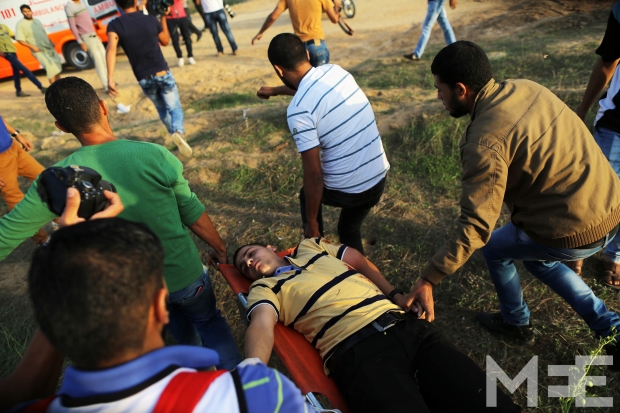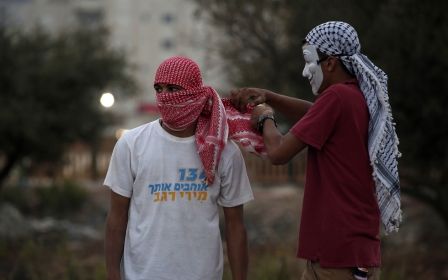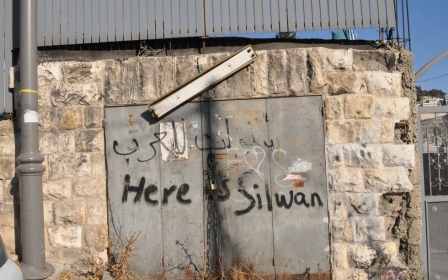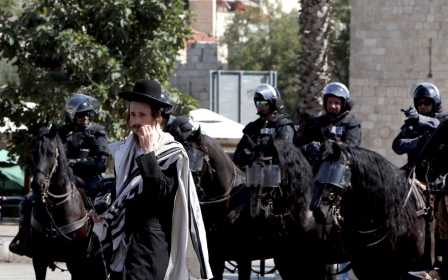Deadly clashes hit Gaza as spate of attacks rock West Bank

Fresh violence rocked Israel-Palestine on Tuesday, with deadly clashes reported in Gaza and a spate of attacks happening in the West Bank.
According to reports, at least one Palestinian protestor has been shot dead in Gaza after Israeli soldiers fired on demonstrators near the border. Fourteen other Palestinians were injured, local media reported.
Gaza's health ministry named the Palestinian who was killed during the clashes as Ahmad al-Sarhi, 27, the Palestinian news agency Maan reported.
Meanwhile, in northern Gaza, eight Palestinians were injured, three by live bullets, according to Maan.
Also on Tuesday, Israeli man has also died near Hebron. His car was hit by stones earlier in the day. According to Israeli news site Ynet, the man, identified as 50-year-old Avraham Asha Chasu, then drove his car into a truck and later died of his injuries.
The Israeli newspaper Haaretz and the Palestinian news agency Maan, however, have reported that the man stepped out of his car after being hit with stones, at which point he was accidentally run over by a Palestinian truck driver who has turned himself in to authorities.
In a separate incident, two Israeli soldiers were slightly injured and their alleged attacker killed on Tuesday after they were rammed by a car in the occupied West Bank, Israeli police said.
The attack took place at the Gush Etzion Junction near an Israeli settlement. After ramming his car into the two men, the driver allegedly emerged from the vehicle brandishing a knife before being shot dead, according to the Jerusalem Post.
UN chief Ban Ki-moon on Tuesday urged Israeli Prime Minister Benjamin Netanyahu to restore calm and not use excessive force against Palestinians, an allegation Netanyahu strongly denies.
Ban told reporters that any misuse of force "may breed the very frustrations and anxieties from which violence and tensions erupt".
Another Israeli soldier killed an assailant earlier on Tuesday near the West Bank town of Bet Awwa after allegedly coming under attack by a Palestinian wielding a knife, according to Israeli media.
The stabbing, which occurred around Beit Awwa in the southern West Bank followed clashes that had erupted near Hebron after the destruction of the home of Maher al-Hashlamoun.
Hashlamoun, a member of the group Islamic Jihad, was given two life sentences by a military court in March for the November 2014 murder of Dalia Lemkus, 26, and the attempted murder of two other people on a road in the Gush Etzion settlement bloc, south of Jerusalem.
The soldier and the alleged assailant have not been identified.
Israeli Prime MInister Benjamin Netanyahu made a visit to troops on the southern Gaza border on Tuesday, claiming that the "three fronts" of the unrest facing the Israeli authorities were "under control". Netanyahu described the fronts as “preserving the quiet on the Temple Mount [the Al-Aqsa compound in Jerusalem]; secondly, in Judea and Samaria [the Israeli name for the occupied West Bank]; and thirdly, in Gaza.”
Palestinian MP arrested in West Bank
Overnight on Monday, the army and members of Shin Bet, Israel's internal security service, arrested Hassan Yusef, a member of the Palestinian Legislative Council and a top West Bank leader of Hamas, in a raid in Beitunia, near Ramallah.
Yusef was a founding member of Hamas in the late 1980s and has spent years in Israeli jails. He was elected to the Palestinian parliament from prison in 2006 and was only released from his last stint in jail in June.
Hamas has always said that Yusef works only for its political wing, not its military wing. The army said on Tuesday that Yusef has incited terrorism and publicly encouraged attacks on Israelis.
Anshel Pfeffer, a journalist with Haaretz, questioned the purpose of Yusef's arrest on Tuesday.
The army's activities come as UN chief Ban Ki-moon was scheduled to visit Israel and the Palestinian territories after nearly three weeks of unrest that have seen at least 44 Palestinians, including alleged attackers, and at least eight Israelis killed.
"Violence will only undermine the legitimate Palestinian aspirations for statehood and the longing of Israelis for security," Ban said in a video message to Palestinians and Israelis released late on Tuesday.
"To the youth of Palestine I say: I understand your frustration. I know your hopes for peace have been dashed countless times," Ban said, adding that the Palestinian youth should turn their frustrations into "a strong, but peaceful, voice for change".
"To the leaders and people of Israel: Let me say, I appreciate your genuine concern about peace and security. I also understand the anger many Israelis feel," Ban said. "But walls, checkpoints, harsh responses by the security forces and house demolitions cannot sustain the peace and safety that you need and must have."
Kerry to meet Abbas
US Secretary of State John Kerry is due to meet this week with Israeli Prime Minister Benjamin Netanyahu in Germany, as well as Palestinian President Mahmoud Abbas.
Last week, Israel announced a wave of new security measures, including the sealing off of East Jerusalem neighbourhoods, the revocation of citizenship from alleged attackers and their families and the intensification of punitive home demolitions. Some Israeli politicians have also encouraged residents to arm themselves to fend off the threat of stabbings and gun assaults.
Israel says its controversial policies act to deter violence, but critics say the approach collectively punishes Palestinians and seeks to fuel the frustration that belies the latest tensions.
Violent incidents have continued since the measures were imposed, including an attack on Sunday that saw an Eritrean asylum seeker shot repeatedly and then attacked by a crowd at the central bus station in Beersheba. Haftom Zarhum, 29, died later from his injuries.
During the same incident, a 21-year-old Palestinian citizen of Israel, Mohannad al-Aqaby - who allegedly shot and killed 19-year-old Israeli soldier Omri Levi and wounded 10 others - was shot and killed.
Middle East Eye propose une couverture et une analyse indépendantes et incomparables du Moyen-Orient, de l’Afrique du Nord et d’autres régions du monde. Pour en savoir plus sur la reprise de ce contenu et les frais qui s’appliquent, veuillez remplir ce formulaire [en anglais]. Pour en savoir plus sur MEE, cliquez ici [en anglais].





